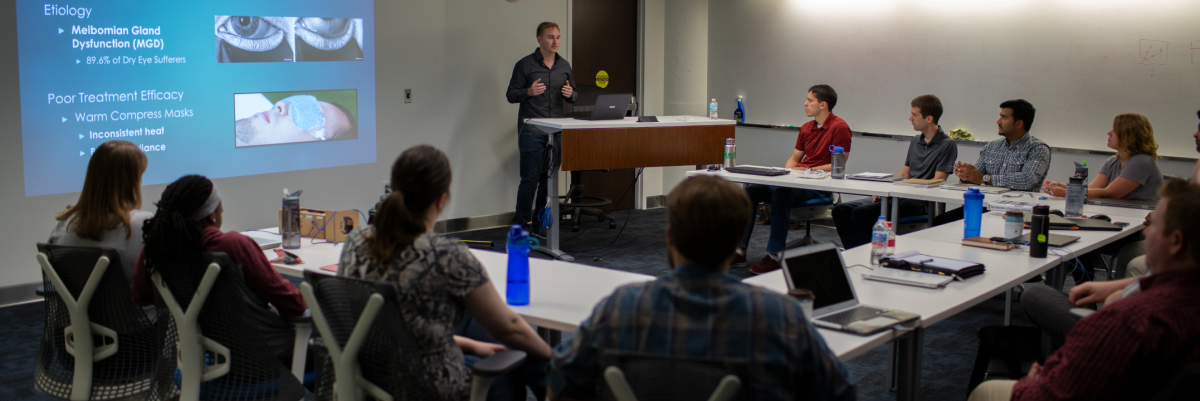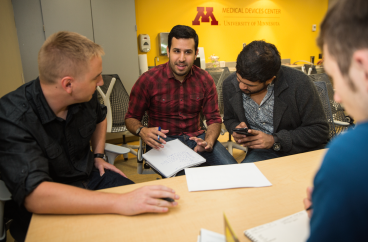Medical Device Innovation Curriculum
Innovative Curriculum for Medical Device Leaders

The Medical Device Innovation curriculum follows a 31-credit degree program in technology innovation management, medical device innovation practica, medical technology macro environments, and a capstone. Students meet on average two to three nights per week with a practicum course on occasional Saturdays, completing the program in just 21 months.
A detailed breakdown of the course curriculum by semester is laid out in the menus below:
MDI Curriculum
*The curriculum below is for students who began Fall 2023. Please note the curriculum is subject to change.
+
Term 1 - Fall
MDI 5004 Clinical Foundations of Medical Device Innovation (3 credits)
Become effective in clinical environments by gaining knowledge regarding surgical protocols; physician, surgeon, nursing and technical support functions; medical terminology, anatomy and physiology; ethnology research; healthcare law; Medicare/Medicaid; and HIPAA requirements.
MDI 5010 Product Development and Innovation Management (2 credits)
Framework for conceptualization, design, development, commercialization process for medical products. Survey of key steps in innovation, from engineering/business perspective. Cross-functional development of concepts/processes.
MOT 5012 Understanding Technology of the Future (2 credits)
This course is designed to give students knowledge and skills necessary to be successful technology leaders in a variety of business settings and industries. Technology leadership begins with the understanding of what new and innovative technologies are being developed around them. But it is also important for leaders to be able to understand if those technologies are relevant and important for their business. Technology leaders need to work collaboratively with other business leaders to ensure new technologies are grounded in business strategies and understand what the company can leverage.
MOT 8133 Managerial Communications for Technology Leaders (2 credits)
Persuasive strategies for connecting with an audience, creating goodwill, building trust and reducing conflict while avoiding common errors that undermine credibility. Features nine behavioral practices for speaking effectively while thinking on your feet.
+
Term 2 - Spring
MDI 5013 Medical Device Center Practicum I (2 credits)
Gain added focus on teaching innovation steps and processes using known clinical needs as examples in collaboration with the Medical Device Center.
MOT 5010 Enhancing Technology Leadership Skills (2 credits)
This course focuses on preparing students to be leaders in the technology industry, with a focus on understanding their personal values, emotional intelligence strengths and challenges, business and technical communication, persuasion, personal management, and impact. Critically important to success is demonstrating executive presence and gravitas when dealing with all levels of the organization - staff, leaders, and customers. Organizations, team responsibilities, and roles are constantly evolving, and it is up to savvy technology leaders to be future-focused - anticipating and understanding what the organization needs today - and what it will need to grow, and change driven by the business strategies. A technology leader must be a strategic thought leader, a catalyst for change, and think through innovative and values-driven strategies for their work and their organizations.
MOT 5013 Leading the Business of Technology (2 credits)
This course is designed for people with a basic understanding of business principles in a technical setting and are looking to progress toward being a technology leader. This course will bring together knowledge and skills necessary to be a leader in budget, legal, pricing, marketing, and finance facets, strategies, and formulation, and consider portfolio management and business governance on a foundational level. There will be lecture and hands-on components.
MOT 8214 Technology Foresight and Forecasting (2 credits)
Examination of tools and techniques for strategic foresight and forecasting of technology deliverables. Applies tools and concepts to critical decision-making for corporate and organizational strategy. Topics include technology analysis, dynamics, evolution, management and resource allocation.
+
Term 3 - Fall
MDI 5008 Quality, Regulatory and Manufacturing Management (3 credits)
Examine process validations, Good Laboratory Practice (GLP), Good Manufacturing Practice (GMP), appropriate management of Standard Operating Procedures (SOPs) and knowledge sharing across the value chain.
MDI 5014 Medical Device Center Practicum II (2 credits)
Apply the skills learned in the first practicum through a clinical immersion at the University of Minnesota's Academic Health Center, which is in collaboration with the Medical Device Center.
MDI 5020 Medical Device Innovation Capstone (0.5 credits)
Learn about design, management, and operation of infrastructure, connect concepts and methods as you prepare a proposal, conduct the project and report the results in written and oral form.
MOT 5011 Creating a High-Performing Technology Organization (2 Credits)
This course will provide the student with a blueprint for creating and maintaining a technical workforce that is high-performing and diverse, helping students become technical leaders that can effectively lead a transformation to support business strategies. This course will provide the tools and context to ensure the technology leader is creating and sustaining a culture of innovation, accountability, and creativity.
+
Term 4 - Spring
MDI 5015 Medical Device Center Practicum III (2 credits)
Build on the skills and clinical experiences from the first practicums to develop a business model and turn innovation into a viable business proposition with exit strategies.
MDI 5020 Medical Device Innovation Capstone (1.5 credits)
Learn about design, management, and operation of infrastructure, connect concepts and methods as you prepare a proposal, conduct the project and report the results in written and oral form.
MDI 5101 Medical Device Cyber Security (3 Credits)
The course will introduce the student to all the security-specific activities needed to meet regulatory and customer expectations across the medical device lifecycle. Emphasis on security testing and post-market vulnerability management are essential goals of the course. The intended audience is graduate students, upper-class undergraduate students, and working professionals.
* For MDI students enrolled in Fall 2022, click here to see the curriculum. To see the curriculum for Fall 2021 or before, click here. Note that students enrolled before Fall 2023 will still need to take Elective courses, see the list here.

Capstone
During the final two semesters in the MDI degree program, students use the knowledge and skills acquired throughout the program to tackle a relevant issue, problem, or subject within their current area of interest and propose innovative recommendations or solutions. The project gives students the experience and confidence needed to grow and advance professionally.
Review the MDI program requirements and scholarship opportunities, then CONNECT WITH OUR ADMISSIONS TEAM to learn how this program can help you get closer to your career goals.